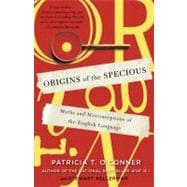
What is included with this book?
| Introduction | p. xiii |
| Stiff Upper Lips: Why Can't the British Be More Like Us? | p. 3 |
| Grammar Moses: Forget These Commandments | p. 17 |
| Bad Boys of English: And Why We Still Love 'Em | p. 44 |
| Once Upon a Time: The Whole Nine Yards of Etymology | p. 61 |
| Sex Education: Cleaning Up Dirty Words | p. 79 |
| Identity Theft: The Great Impostors | p. 93 |
| Au Oeuf Is an Oeuf: Fractured French | p. 109 |
| Sense and Sensitivity: PC Fact and Fiction | p. 121 |
| In High Dungeon: And Other Moat Points | p. 153 |
| Brave New Words: The Good, the Bad, the Ugly | p. 174 |
| Afterword: Morocco Bound | p. 197 |
| Notes | p. 205 |
| Bibliography | p. 245 |
| Acknowledgments | p. 249 |
| Index | p. 253 |
| Table of Contents provided by Ingram. All Rights Reserved. |
The New copy of this book will include any supplemental materials advertised. Please check the title of the book to determine if it should include any access cards, study guides, lab manuals, CDs, etc.
The Used, Rental and eBook copies of this book are not guaranteed to include any supplemental materials. Typically, only the book itself is included. This is true even if the title states it includes any access cards, study guides, lab manuals, CDs, etc.
Excerpted from Origins of the Specious: Myths and Misconceptions of the English Language by Stewart Kellerman, Patricia T. O'Conner
All rights reserved by the original copyright owners. Excerpts are provided for display purposes only and may not be reproduced, reprinted or distributed without the written permission of the publisher.